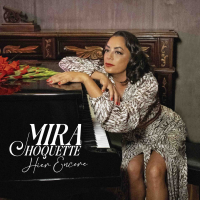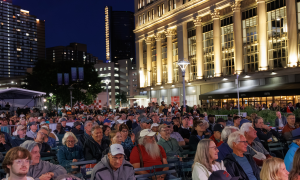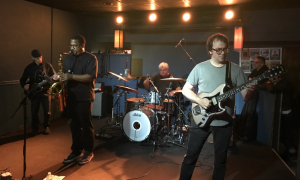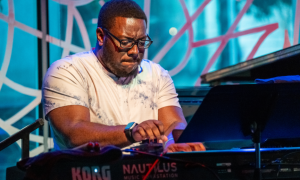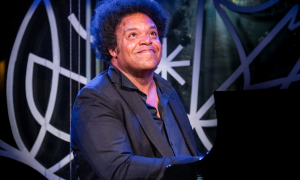Home » Jazz Articles » Live Review » AACM Great Black Music Festival
AACM Great Black Music Festival
Philadelphia, PA
June 4-13, 2011
It's been a hot half decade for the Association for the Advancement of Creative Musicians.

Nicole Mitchell
fluteb.1967

Ernest Dawkins
saxophoneb.1953

Muhal Richard Abrams
piano1930 - 2017

George Lewis
tromboneb.1952
Concerts and panel discussions featured
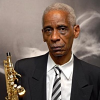
Roscoe Mitchell
saxophoneb.1940

Wadada Leo Smith
trumpetb.1941

Henry Threadgill
woodwindsb.1944

Mike Reed
drumsb.1974

Jeff Parker
guitarb.1967
When he approached the designated stage area an hour later the first thing he did was to pick up the music stand and set it out of the way, a clear demonstration that this would be about improvisation. He then carefully arranged his mutes and a water bottle on the red rug that marked his turf. He played a couple minutes muted then paused to remove it, carrying forth with a sequence of abruptly shifting dynamics as if he was playing with a pantomime mute, and then retrieved it again for a remarkable display of variety and subtlety in technique. He carried on with a mournful ballad—cohesive and tonal and resolving perfectly, if not taking the most direct route to get there—before giving a dramatic reading to his composition "Albert Ayler in a Spiritual Light," realized as a march, a cry and a yell.
The ideas seemed to come easily and were delivered economically: clarion calls, staccato progressions and blurred, multi-phonic phrases coexisted peacefully. Short expressions were interspersed with momentary gaps to reposition and begin again. It rarely struck as "bluesy" but did recall a statement he made during the afternoon panel during which he countered formulaic blues playing. "It's not a progression, it's an interchange between the I and the V and you can choose where you want to go from there," he said, and later, in a sense, showed. There was, as is often the case with his playing, something perplexing about it. It's always very thoughtful, cognizant music, but it's never easy to see just what's going on behind the glare of his horn.
The following night brought Threadgill's increasingly powerful sextet Zooid to the Christ Church Neighborhood House, playing a set of mostly new material. They opened with a piece called "So Pleased, No Clue," fragile but assured, with Threadgill on alto sax. The piece and the band seemed to grow in confidence together, increasing the volume, but remarkably not the speed, and then receded again, beautifully. "A Day Off" pushed harder, a wonderful rumble over which different instruments (in particular guitarist

Liberty Ellman
guitarA long section in the middle of the set proved to be a small revelation within Threadgillia. Incorporating the composition "Mac V" (and maybe some others) the half-hour arc opened with an unaccompanied bass solo, during which
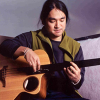
Stomu Takeishi
bass
Jose Davila
tuba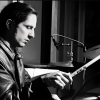 "
data-original-title="" title="">Elliot Humberto Kavee—interspersed with musical interludes, Threadgill sitting out and listening intently. Eventually Takeishi forced a groove onto the proceedings and Threadgill at last lifted his flute and played for a brief couple minutes before a third drum solo led into an unaccompanied cello section by
"
data-original-title="" title="">Elliot Humberto Kavee—interspersed with musical interludes, Threadgill sitting out and listening intently. Eventually Takeishi forced a groove onto the proceedings and Threadgill at last lifted his flute and played for a brief couple minutes before a third drum solo led into an unaccompanied cello section by 
Christopher Hoffman
cellob.1978
The rest of the program was achingly familiar, ramping up to ecstatic levels, and considerable volume for what is essentially an acoustic band. There's something formulaic about Henry Threadgill's music—which isn't to say it's always the same. Not at all. Or to say it's predictable or that his working methods don't change over time. It isn't and they do. It's not even to say that one can quite approach the formulae by listening. But it's always clear that there are systems at play, working methods being put to use. There is a sameness, perhaps, but it's a glorious sameness.
The second weekend brought two concerts featuring Roscoe Mitchell, and (with a little overlap) two concerts featuring AACM members as composers with other ensembles playing their works.
Mitchell performed with his longstanding Sound Ensemble at the Settlement Music School on June 12, opening with a section of a piece commissioned for the 2011 Angel City Jazz Festival in Los Angeles. Titled Angel City 2011, the piece featured the leader on whistles and wooden recorders with

A. Spencer Barefield
guitar
Jaribu Shahid
bass, acousticb.1955

Hugh Ragin
trumpetThey were then joined by baritone

Thomas Buckner
vocalsThe concert of chamber music at the German Society of Pennsylvania featured four of Mitchell's compositions ranging from solo piano to the 24-piece SEM Ensemble. Joseph Kubera opened the evening at the piano, playing the Nancarrow-like time-shifting complexities of "8/8/88" beautifully. Mitchell composed the piece for him (the title connotes the date Mitchell began work on it). He was then joined by Buckner for a setting of three E. E. Cummings' poems entitled "because it's / this / dim." Mitchell has set Cummings' verse to music before: "O the sun comes up-up-up in the opening," from the 1995 album Pilgrimage (Lovely Music) also featured Kubera and Buckner. The operatic baritone can be a controversial presence in some new music circles, but Mitchell has a particular knack for using him. The three brief Cummings' pieces were quite beautiful.
The night was given the moniker "An Evening of Chamber Works," but it was no doubt largely a jazz audience, many of whom were attracted either by Mitchell's name or the late addition of a horn duo with

Evan Parker
saxophone, sopranob.1944
The second half of the program featured New York's S.E.M. Ensemble playing Nonaah and Non-Cognitive Aspects of the City with bassoonist

Sara Schoenbeck
bassoon
Art Ensemble Of Chicago
band / ensemble / orchestra
Joseph Jarman
saxophone1937 - 2019
Working as both performer and composer has been key to the AACM philosophy since the beginning, when Muhal Richard Abrams (who founded the Experimental Big Band that eventually gave birth to the organization) would require all members to bring compositions to the rehearsals. So it was nicely appropriate that Ars Nova included two features on members as composers.
The final night featured the Collide saxophone quartet playing "Background," an unrecorded work by Threadgill originally written for the
 "
data-original-title="" title="">ROVA sax quartet. It's an unusual piece, not immediately recognizable as Threadgill (whose is generally so enigmatic) and it features the soprano (played with finesse here by
"
data-original-title="" title="">ROVA sax quartet. It's an unusual piece, not immediately recognizable as Threadgill (whose is generally so enigmatic) and it features the soprano (played with finesse here by 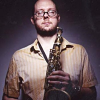
Jeff Hudgins
saxophone, altoThe quartet piece was followed by an improvised set by two younger players with AACM connections, guitarist

Jeff Parker
guitarb.1967
Prior to their set, they engaged in an open conversation with journalist David Adler, which proved to be a candid and informal report on the current state of the organization.
"It's a great old house but the plumbing hasn't been done in years and the wiring is all messed up and after a while you've patched up all you can," said Reed, who served as the AACM's vice chair from 2009 until earlier this year. "There's a difficulty with trying to re-imagine what the organization is supposed to be about and what it can be about."
There's something of a generation gap in the group, he explained, with different understandings about how to use the Internet and how and where to book performances and a general lack of agreement on the relevance of being entirely self-reliant in a very different world than that of 1965.
"A lot of older members are still fixed to that older idea and if you can't let go of that older idea, it can't grow," he said.
Much could be pulled from (or projected onto) their appearance at and placement within the festival. Following two weekends by members of the first generation, these perhaps third wave players closing the festival clearly stated a positive coda that the reigns are not being left to fall slack. At the same time, however, it would be hard to call the duo an AACM band. Parker has a long tenure with former co-chair Ernest Dawkins (next year will mark his 20th anniversary with Dawkins' New Horizons Ensemble) but has never been a formal member of the organization. And Reed, although a former executive with the organization, doesn't present himself as wholly a part of it as such past members as

Lester Bowie
trumpet1941 - 1999

Mwata Bowden
saxophoneb.1947
The organization was born at a time of liberation struggle and group and party identity, when "membership card" didn't mean American Express. The current day is more about the individual than the coalition. It may be that it's a model that's outmoded: Artists can book their tours and record and distribute their music on their laptops now. But it might be just as true that the fact that these musicians, young and old, have a name recognition to bank on, that the idea of "Great Black Music" as a reference point has a place within the jazz conversation, and that an organization in Pennsylvania devotes five nights and considerable energy and resources to celebrating the AACM achievement, all are a measure of 45 years of success.
Tags
AACM: Great Black Music Festival: Philadelphia, PA, June 4-13, 2011
Live Reviews
Kurt Gottschalk
United States
Nicole Mitchell
Ernest Dawkins
Muhal Richard Abrams
George Lewis
Roscoe Mitchell
Wadada Leo Smith
Henry Threadgill
Mike Reed
Jeff Parker
Liberty Ellman
Stomu Takeishi
Jose Davila
Elliot Humberto Kavee
Christopher Hoffman
A. Spencer Barefield
Jaribu SHAHID
Hugh Ragin
Thomas Buckner
evan parker
Sara Schoenbeck
Art Ensemble of Chicago
Joseph Jarman
Rova
Jeff Hudgins
Lester Bowie
Mwata Bowden
Comments
PREVIOUS / NEXT
Support All About Jazz
 All About Jazz has been a pillar of jazz since 1995, championing it as an art form and, more importantly, supporting the musicians who make it. Our enduring commitment has made "AAJ" one of the most culturally important websites of its kind, read by hundreds of thousands of fans, musicians and industry figures every month.
All About Jazz has been a pillar of jazz since 1995, championing it as an art form and, more importantly, supporting the musicians who make it. Our enduring commitment has made "AAJ" one of the most culturally important websites of its kind, read by hundreds of thousands of fans, musicians and industry figures every month.





 Buy Now
Buy Now



